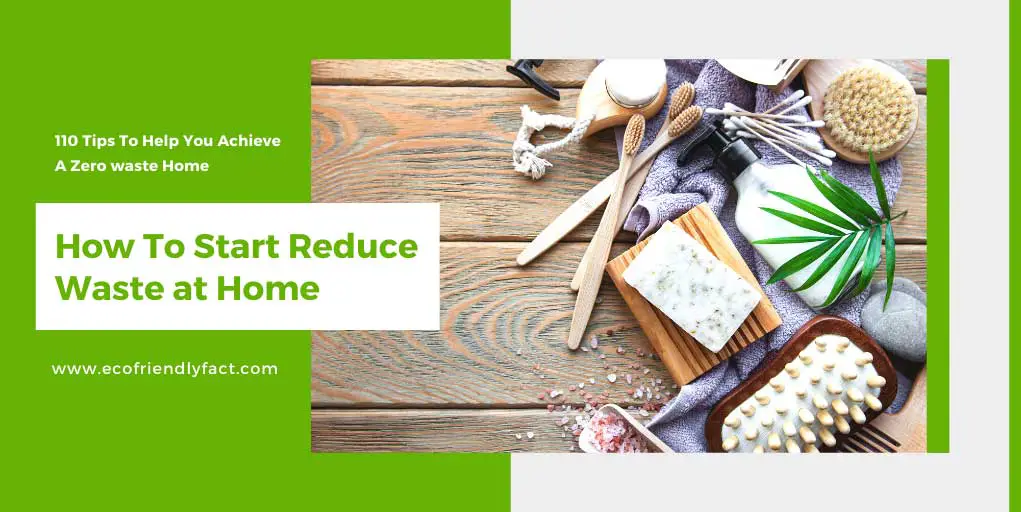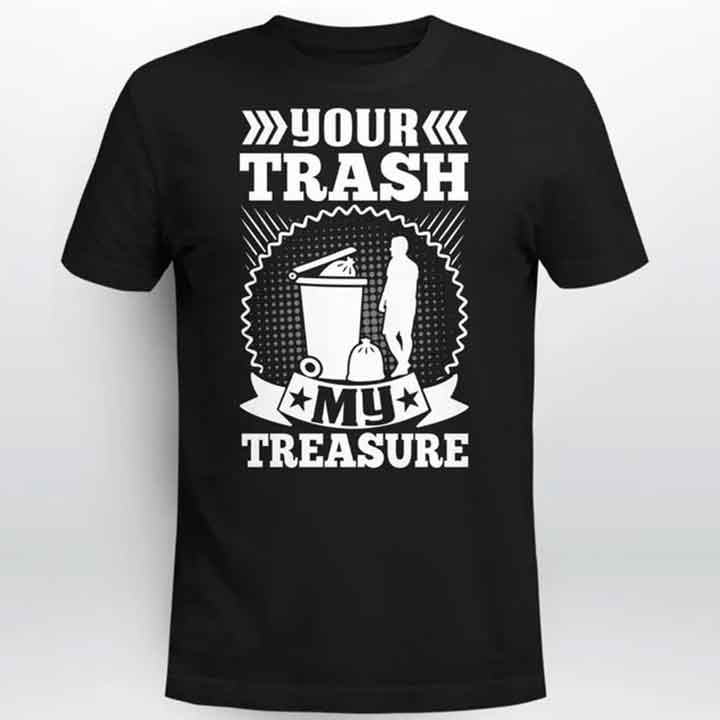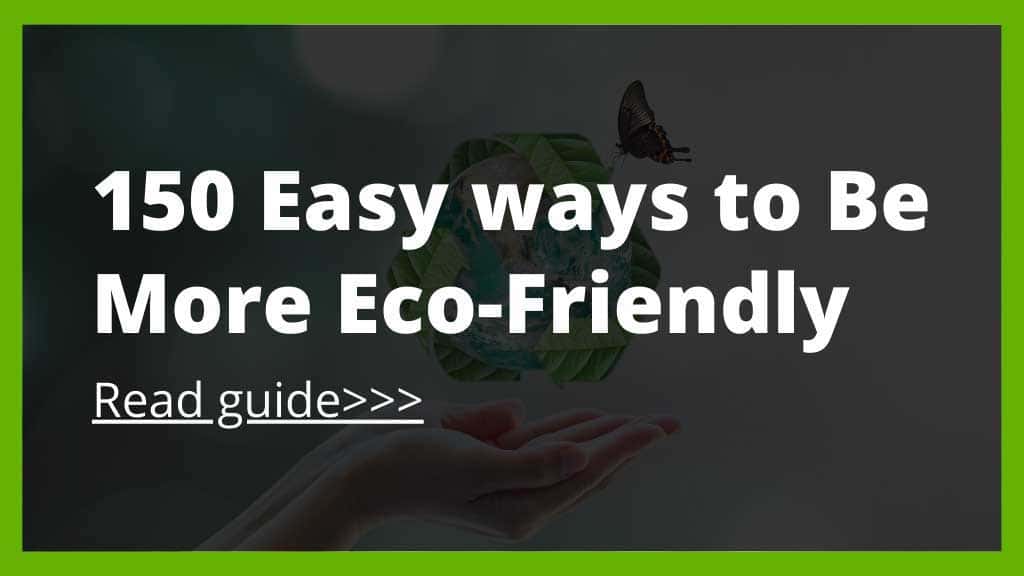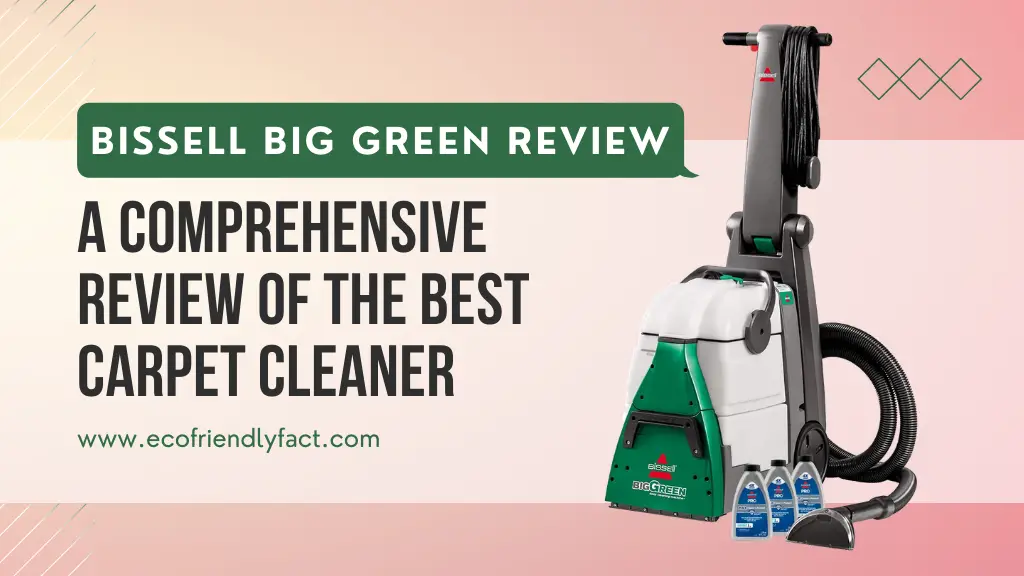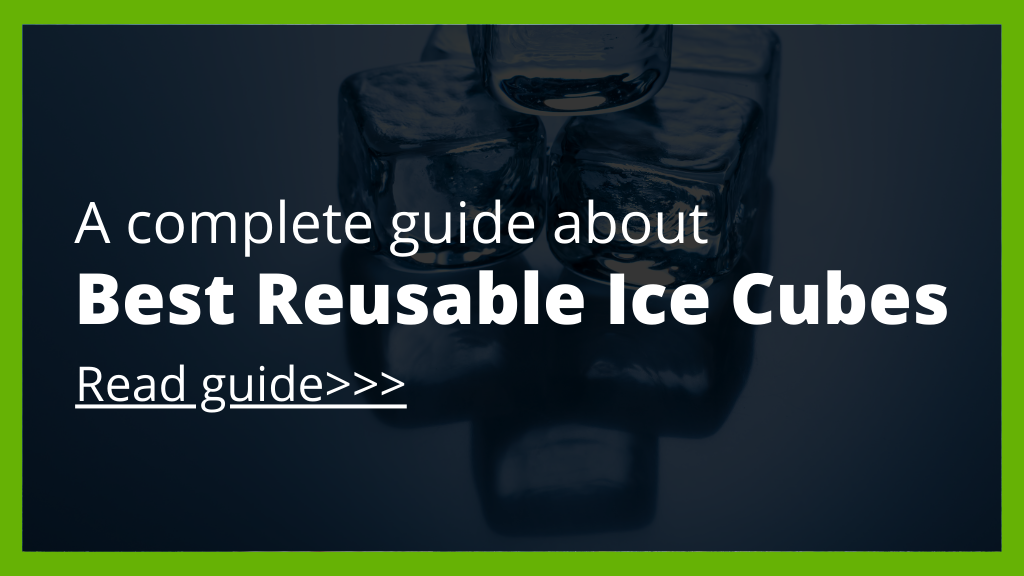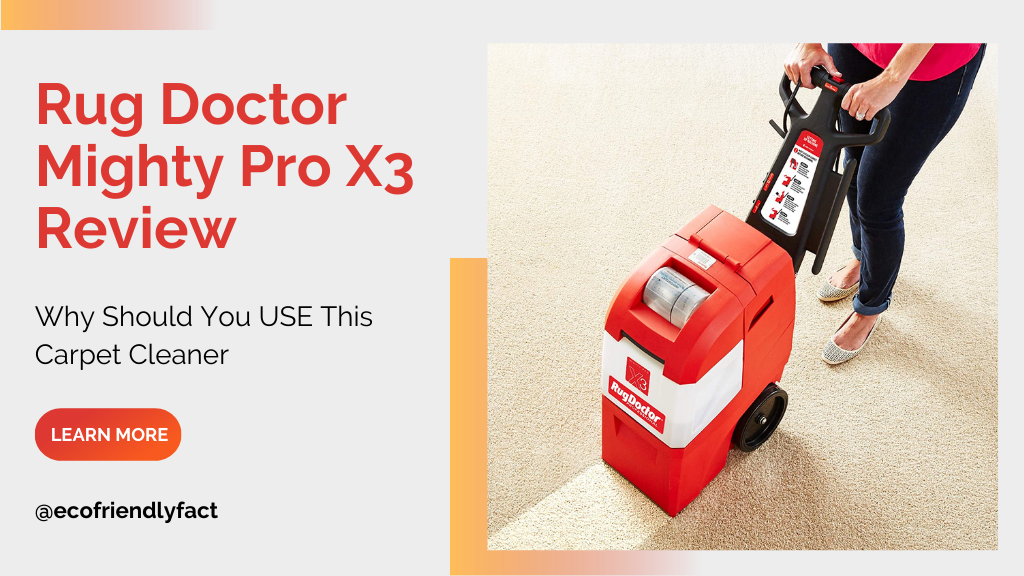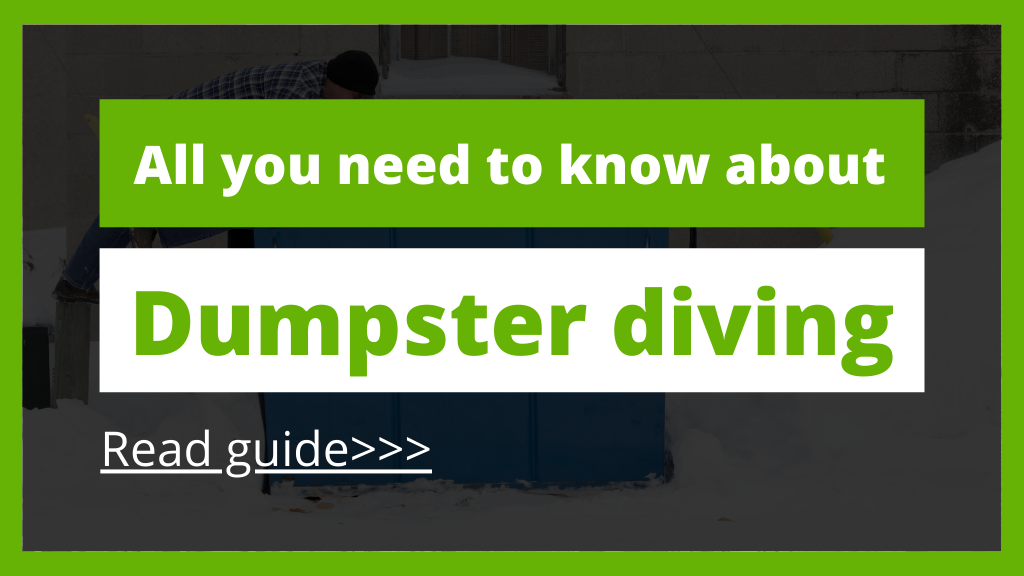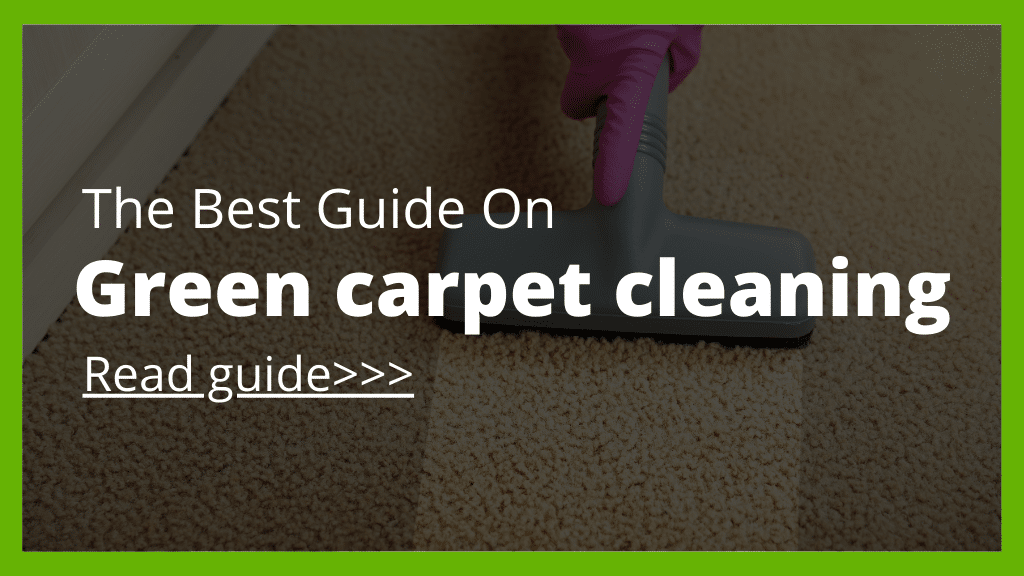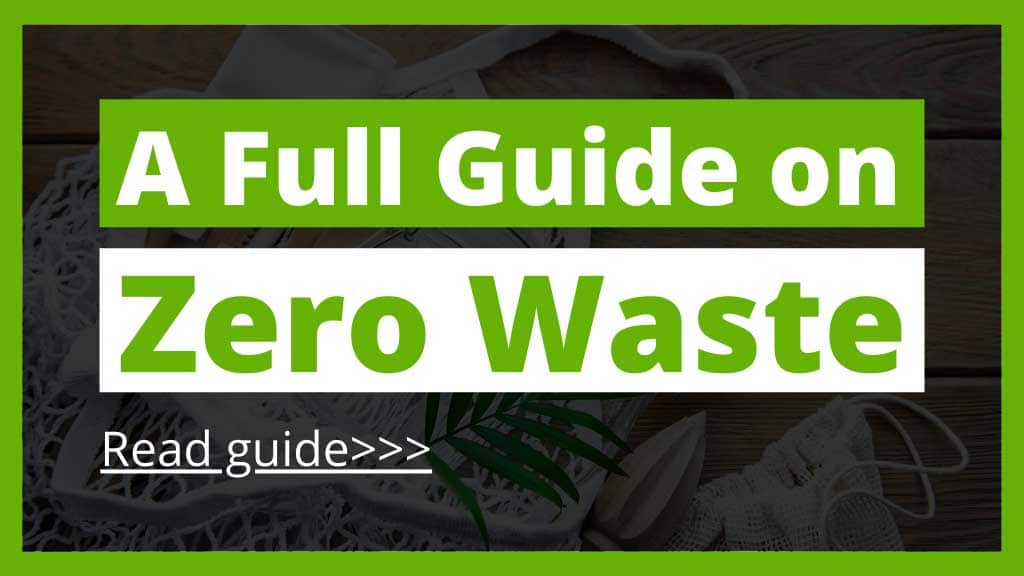A Complete Beginner’s Guide On Making Your Home Zero Waste
A U.S. resident produces 4.4 pounds of trash every day. This number leads up to 250 million tons of trash per year in just the U.S. This number may seem unreliable to you, but imagine carrying ten different plastic bags just for grocery shopping each day. Apart from groceries, we also produce kitchen waste, bathroom waste, takeaway food waste, etc. Many people do not believe that making their home zero waste is possible either.
To reduce this huge pile of trash per person, leading a sustainable lifestyle is essential. But a sustainable lifestyle is not the only solution. Making your home zero waste is needed too. But as we said in the beginning, many do not think it is possible. But, did you know that an average zero waste home produces only a jar of waste per year?
If you are surprised and want to do the same, then rest assured. We will be telling you how to make your home zero waste in this article. From the basics of zero waste home to tips that will make your home zero waste, you will find everything here.
What Is Zero Waste At home?
A zero waste home is a household that produces that bare minimum trash every year. In a zero waste household, you require making certain changes, like not using single-use plastic, recycle, reuse whatever you can.
A zero waste lifestyle pushes you to question the norm, find a solution that fits your zero waste quest, and finally, find a solution that is both zero waste and convenient.
Many young millennial women are leading the zero waste movement in the U.S. They produce an eight-ounce sized jar of trash yearly. One of them is Kathryn Kellogg, a zero waste blogger hailing from California. She is also the founder of the website, Going Zero waste, and an author of the book, 101 Ways to Go Zero waste.
Kathryn has reduced her trash output in large amounts once she started living zero waste. According to Kathryn, she has saved around $5000 in 2 years, just by going zero waste and making her products at home.
Why Should We Go Zero waste?
Going zero waste is a movement fuelled by climate awareness. Although many climate-aware and sustainable living people are not aware of how much waste they produce in a day.
But, living a zero waste life is undoubtedly the best thing you can do for the planet. Because, through a zero waste lifestyle, you can reduce the trash and plastic pollution in landfills, waterways, and the ocean.
You can prevent resource extraction and usage. You can directly impact plastic incineration globally by not using single-use plastic. You can reduce your carbon footprint since you are refusing to take part in transportation pollution, and disposal.
5Rs Of Zero Waste: 5 Example Of Reduce, Reuse, Recycle, Refuse, Repurpose
The 5 r’s of zero waste management are; reduce what you do not need, reuse what you have, refuse what you can, recycle what you are unable to refuse, and finally, repurpose what you can’t recycle. The 5 r’s of waste management was introduced by Bea Johnson, a famous zero waste management blogger, and author.
Following these 5 steps is essential to a zero waste life.
Reduce
Reducing what you do not need is the first step to downsizing your trash output. This step introduces you to a minimal lifestyle free of single-use plastics and harmful materials.
Learning to let go of what you do not need is going to help you become personally sustainable as well. In this step, you find and recognize the things you need to survive and the things you do not need at all. For example, that pile of business cards in the back of your wallet or the huge pile of jeans you thought you will wear once you lose weight.
Reuse
Reuse instead of replacing. The method of reusing teaches you to use things as long as you can. If you have a shirt with a tear, instead of buying a new one, sew it and use it. It is what reusing teaches us. Reusing helps you to save money the most.
Refuse
Refuse is quite similar to reducing. However, it is quite different as well. Refusing to use harmful products like single-use plastic bags, synthetic laundry detergent, etc helps you to contribute to the betterment of the climate.
Refusing to take part in the deterioration of the climate and the planet helps you to make your goals clearer.
Recycle
Recycling is a must. But as we have said before, the goal of zero waste management is not recycling more, but using less and recycling less. If you end up using single-use plastic by any chance, make sure it is a recyclable one. And be sure to recycle it as well.
Recycling is the second to last step. If there is something you can’t reduce, refuse or even reuse, then recycle it.
Repurpose
Repurposing or upcycling is a popular step in the zero waste community. If you have something that you can’t reuse, or recycle; upcycle it to make something different out of it.
If you do not want to do it on your own, then donate the stuff to a local craft store, where it will be upcycled. Many organizations collect donations to upcycle and make climate-friendly products. Look for one online and donate.
5 Benefits Of A Zero Rubbish Home
Many people don’t want a zero waste lifestyle because they think it is too hard. Or maybe it is just another “hip” movement without any actual benefits. Here are 5 benefits of a zero waste lifestyle:
1. Going Zero waste Saves Money
Going zero waste requires reduction. Reduction leads to trash downsizing. Going zero waste does not mean more recycling. It means using less meaning recycling less. The lesser you use, the lesser you spend.
With a zero waste lifestyle, you will practice leading a minimalistic lifestyle as well. With minimalism, you do not need a lot to function. You will be assessing and prioritizing your needs; a rare step in our regular lifestyle. Through this step, you will be able to get rid of many things you don’t need in your house.
Many eco-friendly alternatives are expensive. However, these alternatives are supposed to be used for a long time and will be saving you money in the long run.
2. Waste-Free Lifestyle Saves Time
A zero waste lifestyle helps you to save time. Sounds quite unbelievable, right? Well, calculate with me.
Calculate all the hours you spend on the line of Starbucks to buy one cup of latte in the morning. Calculate all the time you spend on planning what you need to cook for the day.
Doing your laundry, dishwashing, recycling, garbage disposal, etc every day requires a lot of time. But with a waste-free lifestyle, you no longer need to waste your time either.
You can make your coffee, carry it in your coffee tumbler.
You can make a zero waste recipe book, meal-prep, use a pressure cooker, to save cooking time. You can do one-pot cooking to save dishwashing hours. Do the laundry on weekends at once and save time.
3. Going Zero waste Ensures Usage Of Long-Lasting products
Reusing products is one of the key points of a zero waste lifestyle. Single-use plastic bottles, cups, plates, straws, bags, containers, etc are the main reason behind plastic pollution. Your goal is to reduce the usage of single-use plastic as much as you can. Opting for a reusable alternative is the ideal solution in this case.
When you are buying an alternative for single-use, disposable plastic, you will come across sustainable options made of glass, bamboo, metal, ceramic, etc. Metal cooking ware, glassware, ceramic plates, metal cutlery, metal straws, reusable water bottles, coffee tumblers, etc are sustainable alternatives. These products will last for a long time due to their durable production and nature.
4. Zero waste Lifestyle Promotes Healthy Eating
A zero waste lifestyle requires you to downsize your trash. Buying pre-packaged food at the supermarket means you are getting food filled with preservatives and you are also producing a lot of food.
It is why buying fresh, organic food from the farmer’s market is essential to many zero waste practitioners. We, too think it is a great idea. Buying fresh vegetables from your nearest market means less transportation pollution. It means you are eating fresh food free of herbicides, pesticides, and chemicals.
Going zero waste also means growing your seasonal vegetables and herbs.
Junk foods, soda, packaged fruits, etc are not welcomed in a zero waste lifestyle either. With a waste-free lifestyle, cooking your food is encouraged. All these steps lead to one thing, a healthy eating habit.
5. A Waste-Free Home Teaches Kids Valuable Lessons
Climate awareness is the main reason people are going zero waste these days. Making your home zero waste will teach your kids a valuable lesson. It will teach them to cherish, respect, and be responsible for the planet.
Truth be told, climate awareness was not a concerning issue even ten years ago. Well, even on this day, political leaders do not care about the climate. Meanwhile, industrial pollution keeps growing day by day.
In a situation as grave as this, we are all our future generations have. If we do not teach them to love and respect nature, they will never be able to understand the importance of becoming environmentally responsible.
Living a sustainable and eco-friendly life helps you to make your home zero waste. A zero waste home will encourage the children to live a life like this in the future.
110 Tips To Help You Achieve A Zero waste Home
Before you decide to go zero waste, buy some essentials. A reusable water bottle, reusable coffee cups, linen grocery bags, non-plastic jars, and containers are a must. Some other things you need to follow are;
Zero waste Kitchen
- Paper towels are essential in many households. Unfortunately using one paper towel to wipe wet plates, or dry wet counters can make your paper waste grow by large numbers. Swap paper towels with reusable cotton towels, or bamboo dish towels. Cotton towels that can be cleaned and reused will reduce paper waste in no time.
- If you are shopping for dry ingredients, buy in bulk. This will save multiple tours to the market. Find the closest farmer’s market to your home, and buy fresh goods every day.
- Find your supplier. If you like tortillas but do not want to contribute to plastic pollution by buying pre-packaged tortillas, find a restaurant that will sell tortillas to you. Bring your container, stock your favorite tortillas and you are good to go.
- Practice meal prep. Grocery shopping every day to buy only fresh goods can be exhausting as well. The solution? Buy fresh goods on the weekend, do your meal prep, store in the refrigerator and cook accordingly.
- Only use non-plastic, reusable containers. Glass meal-prep containers or Tupperware is recommended by us.
- Discard bin liners entirely. Trash bags are single-use plastic bags too.
- Keep two garbage bins in the kitchen. One is to discard green waste that can be composted. One is for the rest.
- Save water in the kitchen. Save the vegetable washing water, to water your plants later.
- Make your zero waste recipe book. A recipe book can help you to keep things planned. In addition, practice one-pot cooking more. One-pot cooking will reduce dishwashing. You will not require washing five different cooking ware at the end.
- Buy a pressure cooker. It saves cooking time and helps you to save energy.
- Do not waste seeds. Save the seeds of organic vegetables and fruits, and plant them whenever you can. Always store the seeds in an airtight container.
Zero Waste Bathroom
- Reduce toilet paper waste by switching to a bidet. If you can’t use a bidet as it is considered illegal in many countries, switch to using unbleached and recycled toilet paper instead.
- Swipe bathroom deodorants with natural ingredients like baking soda.
- Opt for a bamboo safety razor instead of buying disposable plastic razors.
- Always buy refills for your shampoo, conditioner, hand washes, etc. We recommend finding an organic and sustainable store to shop for personal hygiene. If there is not any, find an online store instead.
- Stop wasting money on face masks. Make your own at home with natural ingredients like aloe Vera, honey, rice flour, coffee, etc.
- Use free of plastic packaging body soap.
- Stop using sanitary pads or tampons entirely. Invest in a sustainable and eco-friendly menstrual cup.
- If you do not want to use a menstrual cup, buy absorbent briefs instead.
- Use wooden combs and hairbrushes. The body shop wooden hairbrush is great for your hair and the environment.
- Buy all types of personal care products from one place. This will save your money and time at the same time.
- Dentists recommend changing your toothbrush every 3 months. This can lead to a huge amount of plastic waste. Buy a toothbrush with a detachable head. This will ensure you are not compromising your health and reducing waste at the same time.
Zero waste Closet And Clothing
- Zero waste lifestyle teaches us to be more minimalistic. It goes for our closet as well.
- Always shop from small and local clothing stores. Fast fashion is not ethical or climate-friendly at all.
- Follow a “24-hour” rule. If you like a shoe or a cloth, stall 24 hours before making the purchase. If you forget about it after 24 hours, then you truly do not need it.
- Before buying something, list the usage. This will help you to assess and prioritize that product.
- Donate unworn clothing every month.
- If you have friends who are into a zero waste lifestyle as well, arrange a cloth swapping party every once in a while. You can exchange your unworn pieces with new stuff without having to spend money.
- Do not get swayed by trends. Trends change each season. The impulsively shopped things are however left unused in your home.
- Engage in thrift shopping or buying second-hand goods. This will save you a ton of money.
- Buy multi-purpose makeup. For example, three in one eyeshadow-blush-lip tint.
- Try to keep your shoe closet as minimal as you can. If there is a pair of shoes that haven’t been used in ages, donate them immediately. Do not think you will use it someday, because you certainly won’t.
- Be strict with the fit. Do not think you will gain or lose weight someday and then wear a certain piece of clothing. Thinking this way can lead to a huge pile of clothes in your closet, before you can even realize.
Zero waste Gardening With Sustainable Gardening
- Always choose native plants for your sustainable garden. This will help you to control weed invasion in your lawn area.
- Composting is essential for sustainable gardening. And making your compost with green kitchen waste will help you to go zero waste.
- Don’t use herbicides. Instead, look for a green alternative like spreading good insects throughout the garden.
- Save your seeds. Or buy seeds in bulk from your nearest nursery. Don’t forget to bring your seed container to the nursery.
- Make your fertilizer at home. Use natural ingredients like seaweed, manure instead of synthetic fertilizers.
- Use eco-friendly and recycled plant pots.
- Conserve rainwater and water your plants with that. You can install a rainwater catchment tank as well.
- Garden by hand and ditch the lawnmower.
- Plant herbs and seasonal vegetables. It will save money and help you to enjoy organic food.
- Your urine helps the plants to thrive. Sounds unbelievable, right? Well, urine contains nitrogen, potassium, and phosphorus; nutrients your plants need to grow.
- You can learn more about sustainable gardening, by reading our guide on sustainable gardening.
Zero waste Medicines And Treatments
- Try to be as less dependent on medicines as possible. It is not good for your health.
- Seek natural remedies for minor issues. For example, drink plenty of water and walk a little if you are having indigestion. Take an oatmeal bath for relief from eczema and skin inflammation.
- Keep a small supply of medicines around. It is only applicable if you don’t have prescribed medicines. Essentials like aspirin are okay but stocking up medicines you will rarely need is not required.
- Some states do not allow refills and reuse of prescriptions. But if your state allows it, then ask your pharmacist to reuse the prescription.
- Do not stock up medicines you don’t need. Do not buy in bulk either. It is likely to expire before you can use all of it.
- Ditch plastic band-aids. Use cotton balls, and gauge to treat cuts and scrapes.
- It is hard to go zero waste if you have prescribed medicines. In such a case, ask your pharmacist, if they are allowed to give medicines in your pill bottle. If allowed, use air-tight glass jars and store medicines directly inside.
- If you are not allowed to bring your case, then, ask the pharmacist to provide medicine with just the bottle. This way, you can at least reduce packaging and labeling waste.
- Ask for electronic prescriptions from your doctor. Your doctor may email prescriptions instead of following the conventional way.
- Donate your empty pill bottles to the nearest craft store for upcycling.
Zero waste Office Supplies
- Use a reusable notebook. Most reusable notebooks are made from recycled waste. The ink inside can be washed and, the pages are reusable.
- Use the other side of a single-sided printed paper to write. Make your notebook with these. Don’t forget to use a metal clip.
- Donate extra office supplies like papers, pens, pencils. Many NGOs work for disadvantaged students. Donating these supplies will ensure zero waste and help them at the same time.
- You rarely get back the pen someone has asked. Losing your pen means buying more. The next time someone asks for a pen, refuse. Put a stop to the chain of the lost pen and pencils.
- Use refillable pens. Pens with pistons or mechanical pencils that can be reused are a great option too.
- Back up your documents with the help of online storage like the cloud. Replace memory cards or external hard drives.
- Try to reduce using staplers as much as possible. Staplers are not reusable. Use metal clips instead of staplers.
- Printer refills are expensive. Thus, many people prefer buying a new printer instead of buying refills. Reduce your printer usage as much as you can. Save money and then get printer refills.
- Buy paper clips in bulk to save money and packaging.
- Always request recyclable packaging when ordering something online.
- If your office does not have a separate recycle bin, we would recommend you to get one for yourself. Keep your recyclable trash in that bin, and recycle it on your own.
Zero waste Grocery And Dine
- Always bring your container while shopping for cooking ingredients. Bring your cloth bags or reusable grocery bags while grocery shopping. Bring your glass bottles to refill condiments. Use jars or containers to buy wet items.
- We promote making your spices. Buy whole pieces of spices at the farmer’s market, and ground them by yourself.
- Do you not like grounding spices? Find the nearest Asian mart, bring your container, and shop from them.
- Grow your herbs in the back of your lawn or on your balcony. Use them as it is. Or dry them in sunlight, ground, and make your own grounded herbs.
- If the market you are shopping from uses plastic packaging to wrap fresh vegetables, give the plastic packaging back at the counter. The shop will be able to reuse it. And you will fulfill your zero waste goals.
- Always bring your container while ordering takeaway from a restaurant. It will help them save money on packaging, and you will not have to deal with takeaway trash either.
- Always use glassware at the dining table.
- Use cloth napkins instead of using paper napkins.
- Sodas are terrible for your health. Besides, the waste they produce is not insignificant either. Replace sodas with fresh water.
- Serve food directly to the plate. Many people use a cooking pot, a serving pot, and a utensil to eat in. Serve directly to the plate. It will help you to save water on dishwashing.
- Teach your family and friends about zero waste lifestyle. It will ensure they are not getting in the way of your zero waste quest.
- Practice taking homecooked food as a gift to family gathering instead of wasting money on gifts. Teach your family and friends to do the same. Downsize your trash output as a community.
Zero waste Cleaning
- Embrace natural and green cleaners. Green cleaners may not perform as “good” as your conventional cleaners, but they are great for the climate. Natural cleaners do not require extra packaging meaning, zero packaging waste.
- Use baking soda and vinegar to clean toilets, bathroom floors. These can be used as a cleaner for dishes with stubborn grease.
- Ditch your flimsy dishwashing sponge. It may look convenient, but it lasts less than a week. Switch to sustainable bamboo dishwashing brushes or soft metal sponges. We don’t recommend using metal scourers on Teflon pans or pots. Only use it for scrubbing jobs.
- Ditch your vacuum cleaner and save energy. Use brooms to clean the floor and wash with a mop.
- Use natural and eco-friendly dish cleaners only. Buy refills instead of buying a new pack every time. If possible, buy in bulk.
- Ditch the dryer and air dry your clothes. Use metal wire pegs to dry clothes on your balcony.
- If you can’t airdry clothes, then opt for eco-friendly wool dryer balls for your dryer. Dryer sheets are harmful and produce toxins.
- There is no need to do laundry every day. Fix a laundry day once a week and do all of your laundries at once. It will save energy, time, and money.
- Use white vinegar mixed with water to accelerate dish cleaning.
- Only buy plant-derived laundry detergents.
- To clean dirty and greasy sinks, taps, and countertops; use white vinegar, baking soda, and lemon. Cover the area with a paste of vinegar and baking soda for at least two hours. Scrub with a lemon slice.
Go Zero waste By Choosing Quality Products
- Not using good quality products is one of the main reasons people produce too much trash. Whenever you are buying something, ensure the highest quality.
- Shop for household stuff once or twice every three months.
- Save money and invest in good quality and durable products.
- Always buy from eco-friendly, sustainable, and ethical brands.
- Always try to buy metal or glass alternatives.
- Recycled plastic, BPA-free plastic is safe plastic. If you are buying something of plastic, make sure it is recyclable.
- Encourage re-selling or donating unused pieces of stuff instead of hoarding them.
- Make your toolbox, first aid kit, cleaning kit. Handpick each stuff to complete your kit.
- Always buy products with a warranty and replacement guarantee.
- Learn basic repairing methods like sewing. Instead of replacing, repair and reuse.
- If you are buying a paper/plastic bag alternative, try to look for cotton or linen made options. Cotton is durable and strong, and linen is good for your groceries. Unlike other natural fibers, linen does not trap the air inside and keeps your stuff fresh.
Understand Why You Are Into A Zero Rubbish Lifestyle
- You can not go zero waste without determining why you are doing it in the first place. Without the proper reason and cause, you can go back to your regular life and an enormous pile of garbage any day.
- Always believe that it does not happen overnight. You have lived the conventional life for a long time. Going zero waste will require time and patience.
- Make a monthly list of the things you will require at the beginning of the month.
- Compare and select what you need. For example, you can make your reusable cutlery set from the ones at home. You do not need to spend extra ordering one from amazon.
- Before you buy that 6$ latte every morning, ask yourself, is there a way you can do it yourself? If there is, then stop spending so much money on Starbucks and make your own.
- Consume less. The lesser you consume, the lesser you consume, the lesser you produce trash. Although, it may seem hard at the beginning, but once you get the hang of it; you will realize, living in moderation is fun!
- Wanting to go zero waste at once can be tempting. But buying that reusable water bottle you probably will never use is equally damaging as a plastic grocery bag, to your zero waste quest.
- If you are confused, always reach out for help. Many online communities gather zero waste practitioners from all over the world, where they discuss their zero waste methods. Join one of them.
- Do not blame yourself for using one single-use plastic by chance. The goal is to reduce the amount of plastic usage. You should always strive to reduce your plastic usage as much as you can. And remember, it is a process that does not happen overnight.
- Find support, do not get afraid. Many people have joined the zero waste movement before you. But that does not discredit your baby steps towards making your home zero waste.
- Make a zero waste vision board. Check it off weekly or monthly to understand how far you have come. But do it in an electronic device to keep it zero waste!
How Zero Waste Makes You Personally Sustainable?
Zero waste makes you personally sustainable by teaching you to reuse, repair, and repurpose. A zero waste lifestyle is not just about reducing the size of your trash production. It is also about learning, evolving, and becoming more environmentally responsible.
A zero waste lifestyle gives you a different perspective. Perhaps, a broader one. A single plastic straw is not an issue to many. But, a person maintaining a zero waste lifestyle has the eyes to see and understand the bigger picture. It is these small things this lifestyle blesses you with. It is how zero waste makes you personally sustainable.
How Zero waste Is Financially Smart?
Zero waste lifestyle promotes living a minimalistic and sustainable lifestyle. No more impulsive shopping, making your products, only spending money on what you need. These three rules of a zero waste lifestyle make it financially smart.
How Zero Waste Is Good For Others?
Zero waste is good for others because of the positive impact it leaves on the climate. A waste-free lifestyle is needed to reduce the ongoing plastic pollution in our landfills, waterways, and oceans. Disposed plastic trash gets incinerated. Plastic incineration emits GHGs that are equally harmful to the climate.
In 2016, trash incineration released 12 million tons of CO2 into the atmosphere just in the U.S. Although the zero waste movement is a long shot, it is an impactful one. With more people joining this movement, a future free of waste is not far away.
How Can A Household Have Zero Waste?
Achieving a household free of waste is easier than it seems. The first step is to reduce your single-use plastic usage, find eco-friendly reusable alternatives. After that, make a list of the essentials; and things you don’t need. For example, you can function just fine without buying pre-packaged orange juice.
But you can’t live without groceries, right? To make the sorting process easy, go to the area of sorting, look around and decide what you may not need. If you are listing what you may need to discard in the kitchen, go to your kitchen, look around, assess and prioritize your requirements.
Is Going Zero waste Expensive?
When you switch to a zero waste lifestyle, it may look expensive to you in the beginning. Many websites ask you to follow many steps. Many ask you to buy different single-use plastic alternatives. From that perspective, it is expensive.
However, you do not need to buy all the eco-friendly alternatives at once. Start with the essentials, like a reusable water bottle, a few cotton totes for groceries, and other shopping-related usages, a coffee tumbler if you drink takeaway coffee a lot.
Slowly switch to other alternatives. Remember, your goal is to reduce the usage of single-use plastic. You have been using single-use plastic for quite a long time. It is impossible to get rid of that habit overnight.
How Can I Start Living Waste-Free For Free?
To start living waste-free for free, reuse what you have. Upcycle, reuse, and repurpose what you have. If you are on a budget, do not buy new things. For example, you don’t need to spend extra on grocery bags.
Use the cotton totes you have at home. Make a wish list of the products you want to buy. Go through that list and prioritize your needs. Save up, and invest in one product at a time.
Final Words
Hopefully, with the abovementioned tips, you will be able to make your home zero waste in no time.
Everyone’s zero waste journey is different. Everyone moves at a different speed.
Downsizing your trash output is a significant change. A change like this will not happen overnight. A positive mindset is needed the most when you are making a positive change.
Always remember, your goal is to reduce the negative impact on the planet. Trash management does not mean you need to go cold turkey with single use plastic. Reducing your usage of single use plastic at a slow and steady pace will make a bigger difference over time.

